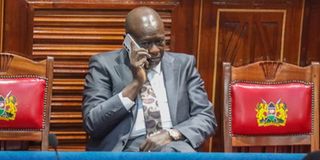
Deputy President Rigathi Gachagua at the Senate for the second day of his impeachment trial on October 17, 2024.
It’s been drama galore at the Senate trial of Deputy President Rigathi Gachagua with the session temporarily suspended, as I file this column, and the DP admitted to hospital.
It is highly unlikely that he will defeat the motion to impeach him, but he has fought a fight that 90 per cent of people in his position would never have put themselves through.
Now the question arises: What does it mean for the government? How will it change our politics and what kind of precedent does it set for the future?
I watched DP’s counsel Elisha Ongoya, counsel brutally go after Kibwezi MP Mwengi Mutuse — a greenhorn lawyer and first term MP — like a hungry hyena, dismembering his case piece by piece, and it occurred to me that Kenya has good lawyers.
It also occurred to me that if you want to impeach a combative Deputy President, it might help to have the motion moved by a lawyer who was admitted to the bar longer than 2018.
Shareholder politics
Overall, it means that, just like we had the wherewithal to write the 2010 Constitution, we have the wherewithal to test it, take it to the limit, give it life and make it a real template that guides how we live and conduct the business of our country. We have the foundations of a strong constitutional order and that should give us some comfort in the system we are trying to build here.
The second impact is going to be on politics, especially “shareholder” politics popularised by UDA where even Cabinet Secretaries are appointed by ethnic shareholders, a poor system that commodifies voting and saddles the country with incompetent people in key policy decision-making slots.
It also has the potential to weaken government effectiveness by distorting the bureaucracy where you have an incompetent minister who has no clue what happens in their ministry and a junior officer taking all the decisions at the direction of State House. At the political level, the impeachment could have the effect of re-arranging the politics of the so-called Mt Kenya region in unexpected ways.
Allow me a few minutes to deconstruct this mountain myth, dismember it like the lawyers in the Senate. Mt Kenya refers to eight counties populated by the Kikuyu tribe and allied ethnic groups, notably the Meru and the Embu. This region was brought together under a quasi-political bloc in 1971 under the Gikuyu, Embu, Meru Association (GEMA) which also had an economic offshoot called GEMA holdings, famously led by the late Njenga Karume, a former MP, minister and tycoon.
Top level impeachment
“Mrima” is a voting machine, and there are plenty of votes there with Kiambu (1,275,008), Meru (772,139), Murang’a (620,929), Nyeri (481,632), Kirinyaga (376,001), Nyandarua (361,165), Embu (334,000) and Tharaka Nithi (231,932) accounting for — excluding the diasporic gas giants of Nairobi (2,415,310) and Nakuru (1,054,856) at least parts of which are seen as extensions of “Mrima” — almost 4,452,806 registered voters in 2022, or 20 percent of total registered voters, by my count. But the vote machine is not just the ballot papers, it is the ground game to mobilise and take the voters to the polling station and get them to vote in certain ways.
It is a collective sense of shared interest, capacity to fundraise for the campaigns and negotiate “shares”. Mt Kenya West owns the machine; they have the votes, the ground game, the campaign finance and the experience to negotiate “shares”. And here comes the chink: West must now overcome the heavy suspicion that it has been negotiating and keeping all the “shares” while selling East euphoria, comradeship and fake kinship.
From what I hear in the mythical ground and the discontent I see, I’m willing to bet my entire maize harvest, its worthless anyway, that if West insists on keeping the DP, in the event that Mr Gachagua is fired, and Interior Cabinet Secretary Kithure Kindiki blocked a second time, East will break away at the next election and that will be the end of this particular voting machine as we know it. And that has implications for future coalitions, most of them good.
The third effect is psychological. This impeachment I special in a way: the President wants to get rid of his deputy and works his majority in Parliament to see it done. He exercises authority over the State and maintains control of the process. This is therefore different from a presidential impeachment where there is hostility between Parliament and the Executive and where the authority of the impeachee is eroded, creating some vacuum.
However, the fact remains that we have crossed the Rubicon; we have had a top level impeachment. Impeachment, therefore, joins the toolkit of politics as an instrument of enforcing accountability — or settling political scores. The process has been tested, lessons have been learned, experience has been gained. This now becomes a part of Kenya’s political culture.
The impeachment has had plenty of drama, but there are some consequences too.
Mr Mathiu, a media consultant at Steward-Africa, is a former Editor-in-Chief of Nation Media Group. [email protected]






